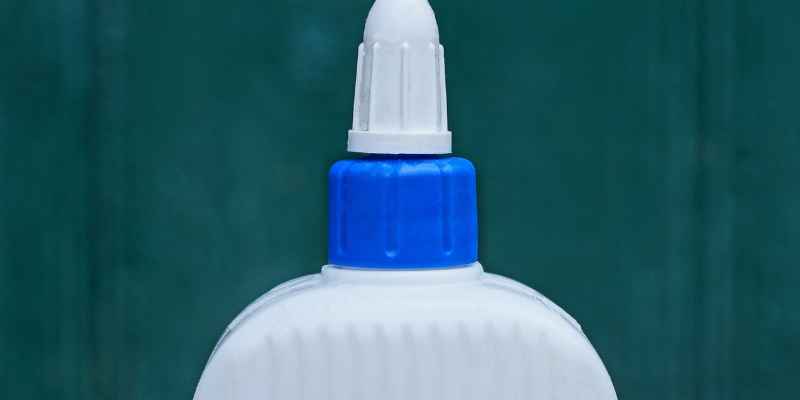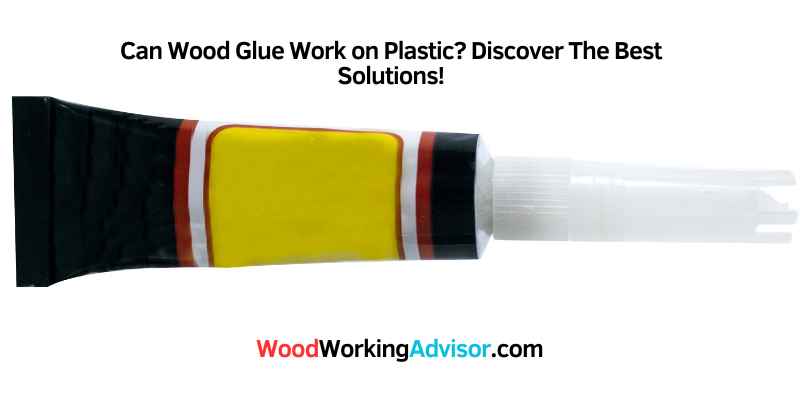Wood glue does not work to attach plastic pieces to wood because they have different properties – plastic is flexible and non-porous, while unfinished wood is rigid and porous. However, there are specific cyanoacrylate-based wood glues that can work with certain types of plastics.
Epoxy and MMA adhesives are also effective options for bonding plastic. These adhesives create a strong bond and can be used on a variety of materials. It is important to choose the right adhesive for the specific materials being used to ensure a successful bond.
Why Wood Glue May Not Work On Plastic
When it comes to bonding different materials, it’s important to consider their unique properties and characteristics. Wood glue, as the name suggests, is specifically designed for bonding wood surfaces together. However, it may not be as effective when used on plastic materials. This can be attributed to the differences in material properties and the nature of porous versus non-porous surfaces.
Differences In Material Properties
Wood and plastic are inherently different in their composition and behavior. Wood is a natural material with a porous structure, making it capable of absorbing moisture and expanding or contracting in response to environmental changes. On the other hand, plastic is a synthetic material that is non-porous and typically more rigid in nature.
Wood glue works by penetrating the pores of the wood surface, creating a strong bond as it dries and hardens. However, since plastic does not have the same porous structure as wood, the adhesive properties of wood glue are not able to effectively grip the surface. As a result, the bond between wood glue and plastic may be weak and prone to failure.
Porous Vs. Non-porous Surfaces
One of the key factors that determine the success of adhesive bonding is the compatibility between the adhesive and the surface it is applied to. Wood glue is designed to work on porous surfaces, such as wood, where it can seep into the small openings and create a strong bond as it cures.
Plastic, on the other hand, is a non-porous material that lacks these small openings. As a result, wood glue is unable to fully penetrate the plastic surface and establish a strong bond. The lack of absorption and adhesion to the non-porous plastic surface leads to poor bonding results.
In conclusion, wood glue may not be the best option when it comes to bonding plastic materials. While it is effective for porous surfaces like wood, plastic’s non-porous nature poses challenges for wood glue to form a strong and lasting bond. Alternatives such as epoxy and MMA adhesive may be more suitable for bonding plastic materials, as they are specifically formulated to work on a range of materials including plastic.
Best Glue Solutions For Wood And Plastic Bonding
Wood glue is not typically effective for bonding plastic to wood due to their different properties. Plastic is flexible and non-porous, while wood is rigid and porous. Epoxy and MMA adhesive are better options for gluing plastic, as they can bond a wide range of materials including plastic and wood.
Epoxy And Mma Adhesive
Epoxy and MMA adhesive is a powerful solution for bonding wood and plastic due to its strong and versatile properties. It results from a chemical reaction between hardener and resin, providing a reliable bond across various materials.
Gorilla Glue For Multi-material Bonding
Gorilla Glue stands out for its ability to bond a wide range of materials, including plastics, metals, elastomers, wood, and porous surfaces. While it excels in bonding most materials, it may not be suitable for challenging plastics like polyethylene and polypropylene.
Testing And Results
Duration for Wood Glue to Dry on Plastic
Wood glue typically takes about 30 minutes to 1 hour to dry on plastic surfaces.
Effectiveness Of Cyanoacrylate-based Wood Glues On Plastic
Cyanoacrylate-based wood glues, such as super glue, are highly effective in bonding plastic due to their quick-drying and strong adhesive properties.
Results:
- Wood glue dries on plastic surfaces within 30 minutes to 1 hour.
- Cyanoacrylate-based wood glues bond effectively with plastic materials.
In conclusion, while wood glue may not be ideal for all plastic applications, cyanoacrylate-based wood glues offer a reliable solution for bonding wood and plastic materials together.
Expert Insights And Recommendations
Trying to use wood glue on plastic may not be effective due to the different properties of the materials. Epoxy and MMA adhesive are better options for bonding plastic to wood as they offer strength and versatility on various materials.
Gorilla Glue can also work, except on certain plastics like polyethylene and polypropylene.
Carpenter’s Glue For Wood And Plastic
When it comes to using wood glue on plastic, it’s important to note that the two materials have different properties. Wood glue is designed to work on porous surfaces, such as unfinished wood, which is rigid in nature. On the other hand, plastic is typically flexible and non-porous.
Due to these differences, wood glue is not recommended for attaching plastic pieces to wood. The adhesive may not form a strong and durable bond, resulting in the objects coming apart over time.
However, there are instances where carpenter’s glue can be used for bonding certain types of plastic and wood together.
For plastic materials that have a compatible porous structure similar to wood, such as certain types of laminates or engineered wood products with a plastic surface, carpenter’s glue may provide satisfactory results. It’s important to test the compatibility and strength of the bond before fully relying on it.
Epoxy As A Reliable Option
Epoxy adhesive is regarded as a reliable option when it comes to bonding wood and plastic. Epoxy is a two-component adhesive consisting of a resin and a hardener. This chemical reaction creates a strong and durable bond that can be used on a range of materials, including plastic and wood.
Epoxy adhesive not only provides a strong bond but also offers excellent resistance to heat, chemicals, and moisture, making it suitable for various applications.
When using epoxy to bond plastic and wood, it’s important to follow the manufacturer’s instructions for optimal results. Ensure both surfaces are clean, dry, and free from any grease or dirt. Apply the epoxy evenly on the surfaces to be bonded and firmly press them together. Allow sufficient curing time as specified by the manufacturer.
It’s worth noting that different epoxy formulations may be suitable for different types of plastic and wood combinations. It’s recommended to consult with the adhesive manufacturer or conduct small-scale tests to determine the best epoxy adhesive for your specific project.
Challenges In Bonding Plastic To Wood

When it comes to bonding plastic to wood, numerous challenges emerge. One major obstacle is the difference in material properties; plastic, being flexible and non-porous, stands in contrast to the rigid and porous nature of unfinished wood. This discrepancy in characteristics hinders the efficacy of wood glue in adhering plastic to wood surfaces.
Adhesion Issues
Adhesion issues between plastic and wood surfaces are primarily attributed to the contrasting properties of the materials.
Considerations For Different Types Of Plastic
When considering different types of plastic, it is essential to ascertain the specific properties of the plastic material before attempting to bond it with wood.
- Some plastics, such as polyethylene and polypropylene, pose challenges due to their resistance to forming strong bonds with wood.
- Epoxy and MMA adhesives emerge as optimal choices for bonding plastic to wood surfaces, offering strength and versatility across a range of materials.
Additionally, it is crucial to recognize that while certain adhesives may effectively bond some plastic surfaces to wood, others may not be as successful. It is therefore imperative to select a suitable adhesive based on the specific types of plastic and wood being bonded.
Community Experiences And Advice
Wood glue is not suitable for bonding plastic to wood due to their different properties. Epoxy and MMA adhesive offer a strong and effective solution for gluing plastic and can be used on a variety of materials, providing a great alternative for this type of bonding.
Reddit Discussions On Gluing Wood And Plastic
When browsing through Reddit threads, one can find various experiences and insights shared by community members who have attempted to use wood glue on plastic. Some individuals have reported successful outcomes when using certain types of wood glue on specific types of plastic. Others, however, have expressed challenges and failures in achieving a strong and lasting bond.
Tips For Achieving Strong And Durable Bonds
Here are some tips that have been recommended by the community for achieving strong and durable bonds when using wood glue on plastic:
- Ensure the surfaces are clean and free from any contaminants before applying the wood glue.
- Consider using a specific type of wood glue that is formulated to bond with plastics.
- Test the adhesive on a small, inconspicuous area to assess its effectiveness before applying it to the entire project.
- Apply consistent pressure and allow sufficient drying time for the glue to set properly.
Despite the varying experiences and advice offered by the community, it’s essential to consider the specific properties of the wood glue and plastic being used, as well as the intended application, to determine the most suitable adhesive for the project.
Conclusion And Final Recommendations
Wood glue is not suitable for bonding plastic to wood because the two materials have different properties. Plastic is flexible and non-porous, while wood is rigid and porous. To bond plastic to wood, it is recommended to use epoxy or MMA adhesive, which is strong and effective for various materials.
Summary Of Findings
Wood glue is not ideal for bonding plastic and wood due to their varying properties. It struggles to adhere to non-porous plastic surfaces.
Best Practices For Bonding Wood And Plastic
- Use epoxy or MMA adhesive: Opt for epoxy or MMA glue for strong and versatile bonding between plastic and wood.
- Surface preparation: Ensure surfaces are clean and roughened for better adhesion.
- Proper application: Follow manufacturer instructions carefully for effective bonding.
- Consider Gorilla Glue: Although it may not work well with all plastic types, Gorilla Glue is known for its versatility.
Frequently Asked Questions For Can Wood Glue Work On Plastic
Is Wood Glue Ok For Plastic?
Wood glue is not suitable for plastic because of their different properties; plastic being non-porous and flexible, while wood is porous and rigid. Epoxy and MMA adhesive are recommended for bonding plastic due to their strength and versatility across materials.
What Glue Works On Plastic?
Epoxy and MMA adhesive work best on plastic due to their strong and versatile nature. Wood glue is not suitable for bonding plastic to wood due to their differing properties.
Does Gorilla Glue Work On Wood And Plastic?
Yes, Gorilla Glue works on wood and plastic. It is specifically formulated to bond a wide range of materials, including most plastics and porous surfaces. However, certain difficult-to-bond plastics such as polyethylene and polypropylene may not form strong bonds with Gorilla Glue.
How Long Does Wood Glue Take To Dry On Plastic?
Wood glue takes approximately 30 minutes to 1 hour to dry on plastic surfaces. It may vary with the type of wood glue used.
Conclusion
Overall, wood glue is not suitable for bonding plastic to wood due to their different properties. Plastic is flexible and non-porous, while wood is rigid and porous. Instead, epoxy and MMA adhesive are recommended as they can create strong bonds between plastic and other materials.
Gorilla Glue is another option, but it may not work well with certain types of plastics. It’s important to choose the right adhesive depending on the specific type of plastic being used.


